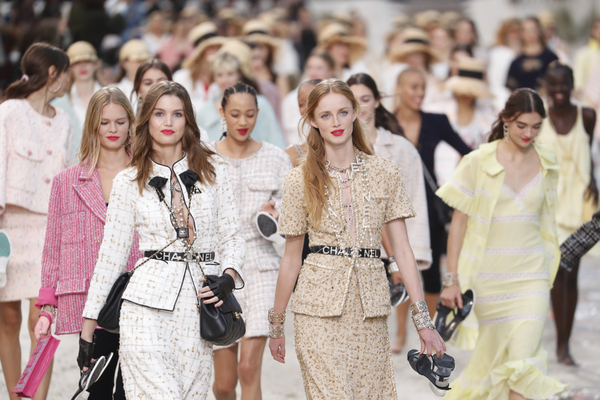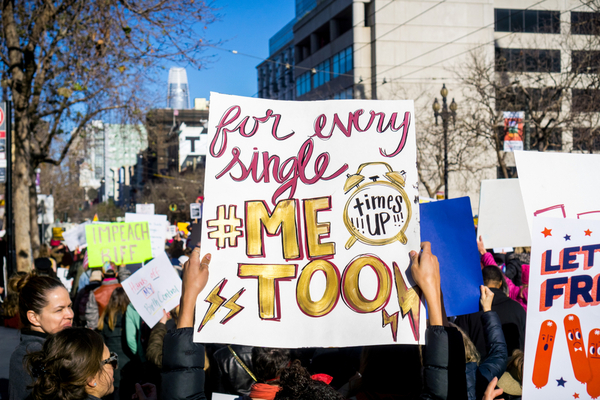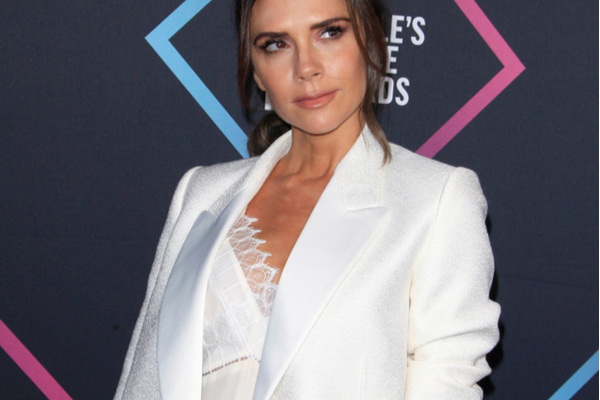The suit has traditionally been seen as a symbol of masculine power. However, with the help of a few female fashion designers, women have claimed the suit as their own throughout history. Women are in no way no strangers to owning the suit. Whether it’s feeling untouchable in a well-tailored pantsuit for a presentation, or wearing a blazer for cocktails, the suit has the potential to assert authority and confidence.
After the tragic loss of Ruth Badar Ginsburg, NYTimes reported on how Ruth used fashion for a feminist statement. Ruth’s signature accessory, the lace collar, has relevance with her fight for equality. To honor Ruth, the Fearless Girl statue in NYC now wears a lace collar. NYTimes Vanessa Friedman wrote: “the idea was to claim what was a traditionally male uniform and unapologetically feminize it.”
Power and Fashion
The recent FIT Museum exhibition, Power Mode: The Force of Fashion, focused on fashion reinforcing power dynamics in both genders.
The exhibition delivered insight into how women have challenged the notion of power as a masculine notion throughout history through fashion. The female suit was a prominent feature of the insightful exhibition. The exhibition featured many prominent female fashion designers such as Coco Chanel. To view the online exhibition, click here.
From Suffragettes to Chanel
From the iconic Suffragette suit to the elegant Chanel tweed suit, female suits have portrayed power in women for decades.
The Chanel suit portrays power in the sense of status, wealth, and formality. Coco Chanel designed the classic suit to appeal strongly to first-wave feminists in the early 20th Century.
Since then the Chanel suit has become a timeless look. The iconic suit has been worn by influential women such as First Lady Jackie Kennedy and Princess Diana. Both Jackie Kennedy and Princess Diana are equated with using their power and influence for good, as they dedicated their lives to helping charities and causes close to their heart.
On the other hand, the Suffragette suit stood for a symbol of unity and good citizenship, worn by brave women who fought for women’s right to vote. The choice of a suit as the Suffragette uniform was most definitely a political statement. The suffragettes sought to challenge convention and tradition, while still dressing smartly and presentable. Despite the presentability of the suit, for the early 20th century, women wearing a suit while fighting for equality was about as radical as it gets.
In the US, the American Ladies Tailors’ Association created the Suffragette suit in 1910. The suit, designed by women for women, had a divided skirt, allowing the women to take long strides. The Suffragette suit made a powerful, yet a subtle statement that any modern female fashion designer would admire.

#MeToo Movement
As apparent with the more recent #MeToo movement, the theme of power has proved as relevant today as ever. The coverage of trials of infamous men Harvey Weinstein and Jeffrey Epstein has highlighted women’s own fight for power. The men, of course, are no strangers to wearing suits and exercising their power themselves.
The culture shifted from sweeping issues under the carpet. Now there is the encouragement of speaking out. Fortunately, women are becoming increasingly confident in voicing their frustration with how men in power have continually used their status and power to unfairly disregard women’s voices.
This new-found confidence in challenging patriarchal views affect fashion whereby women’s suits, particularly well-tailored pant suits, are a prominent feature in the recent fashion weeks around the world.

From Posh to Polished
Many female fashion designers received praised for their collections of feminine suits such as Donna Karen and Vivienne Westwood. For the fall 2020 Ready to Wear collection, Celine also unleashed many female suits.
Victoria Beckham, female fashion designer, and millennial icon has a polished style of wearing classically tailored suits, and regularly designs feminine suits that represent a sense of power. Victoria Beckham advocates for the female suit by designing bold and alluring suits for confident women for her own luxury brand. Like many powerful women, Victoria knows the importance of representing herself through fashion choices.

As long as gender equality continues to be a relevant discourse, power dressing in all forms will continue to make a formidable statement for us all. Moreover, as female fashion designers seek to reflect the current state of our culture, the female suit will continue to evolve to voice the current struggle that needs to be expressed.


